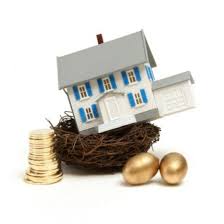
As good as it may be to own a home for its own sake – as a measure of achieving the America Dream – is buying a house a good investment financially?
Well, there is, of course, the building up of financial equity as we pay down our mortgage. And there’s the treatment of our mortgage interest payments that helps us save on taxes (as long as Congress does nothing to take those away from us). But homes as capital growth instruments don’t work like they did during the Wild West days before the housing bubble burst. Overall, on average, home prices will naturally rise at just about the average annual rate of inflation, lagging quite a bit behind other asset classes’ capital gains. Still, a home could be the best long-term investment someone could ever make, even if this has little connection with the value of the commodity itself, because an intangible value of home ownership is the financial behavior it promotes.
Homeowners would have had to spend something for shelter one way or another, whether toward a mortgage or rent. And along the way, they will have had to spend money for home maintenance. Roof repairs or replacements, new appliances, home renovations — all these kinds of expenses have to be subtracted from the anticipated gain in a home’s value.
Budgeting some of our income to protect the integrity of our home’s value is really a form of forced savings. A slowly-deteriorating house, if left to its own devices, will become the opposite of an investment asset. It will degenerate into a money pit — either for us or the next owner.
Being a homeowner ignites an inner sense of financial responsibility and accountability which starts illuminating all other aspects of our financial lives. Working toward homeownership may seem a be-all-end-all focus while trying to achieve it. Once achieved, the broader world of full-fledged financial responsibility rushes in.
So if homeownership as an investment is NOT the be-all-end-all for building net worth and financial security, then what else is there?
Scary as it may sound, there is the stock market.
Stock ownership, especially through instruments like retirement plans or individual retirement accounts (IRAs) utilizing managed and diversified mutual funds, offers a much better opportunity for asset growth and wealth building over time than homeownership does. Robert Shiller, the Nobel Prize winning economist and housing market specialist, writes that homeownership can’t compete with stocks when it comes to creating real financial growth over and above inflation because public companies can plow their earnings back into their businesses, which prompts compounded appreciations in those business’ values over time. And that kind of growth in value continually beats inflation-related home values.
Being a responsible homeowner as well as a wise investor is the best blend of both worlds. That’s the basis of the Pure Hearts R Us’ holistic approach to helping people achieve sound, sustainable homeownership while employing other assets classes and investment instruments – those deemed appropriate through comprehensive financial life planning – as the engines for generating adequate life-long income.
